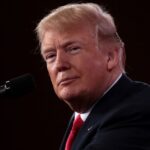


Imagine a small village near Chicago becoming the unexpected battleground for federal policy clashes—welcome to Broadview, Illinois.
Fox News reported that Broadview Mayor Katrina Thompson has taken a stand against federal intervention, rejecting the idea of National Guard deployment amid ongoing tensions between protesters and U.S. Immigration and Customs Enforcement (ICE) officials, while President Donald Trump hints at sending troops to the broader Chicago area soon.
Weeks of unrest have simmered in Broadview, with protesters and ICE agents locked in confrontations that have led to arrests and charges for assaulting federal officers.
As early as Wednesday, Enforcement and Removal Operations agents were visibly stationed outside the ICE facility in Broadview, a clear sign of the federal presence that has sparked local ire.
By Friday, the situation escalated when federal agents deployed pepper balls and tear gas on protesters attempting to block a vehicle from accessing the immigration enforcement building.
Despite the chaos, Mayor Thompson insists the demonstrations have been largely peaceful, with most actions limited to verbal jabs at ICE personnel—a claim that seems to sidestep the reality of arrests and violent charges.
During a press conference on Tuesday, Thompson made her position crystal clear, pushing back against any notion of National Guard involvement in her village.
"We don't need them," Thompson told WLS-TV, doubling down with a confidence that borders on defiance. But one has to wonder if self-governance is enough when federal agents are under siege and public safety hangs in the balance.
Her assertion that protesters are merely vocal ignores the documented clashes—perhaps a convenient narrative to avoid federal oversight, though it’s hard to fault a local leader for wanting to protect her community’s autonomy.
Meanwhile, President Trump, speaking to senior military officers at Marine Corps Base Quantico in Virginia on Tuesday, suggested that National Guard troops could soon be dispatched to the Chicago region, including areas like Broadview.
Having already sent the Guard to cities like Los Angeles and Washington, D.C., to tackle crime and support deportation efforts, the administration seems poised to extend its law-and-order footprint— a move that many conservatives see as a necessary counter to escalating unrest.
Yet, Thompson’s resistance raises a fair question: should federal muscle override local control, or is there room for communities to handle their own disputes, even when the stakes involve federal policy?
ICE, for its part, didn’t mince words in a Tuesday statement, urging Thompson to cooperate with federal efforts to enforce local laws and address violent offenders in Broadview.
The agency accused the mayor of distorting the situation, arguing that their officers are safeguarding the community while facing increasing hostility at the Broadview facility. It’s a sharp rebuke, and frankly, it’s hard to argue with ICE’s frustration when their agents are caught in the crossfire of local protests.
Still, Thompson’s protective stance over her village reflects a deeper tension—one between federal authority and local pride—that won’t be resolved by tear gas or troop deployments, but by dialogue that neither side seems eager to start.



